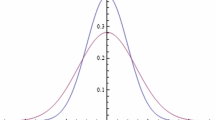Abstract
The power divergence family of Cressie and Read (1984) is a highly popular family of density-based divergences which is widely used in robust parametric estimation and multinomial goodness-of-fit testing. This family forms a subclass of the family of ϕ-divergences (Csiszár, 1963; Pardo, 2006) or disparities (Lindsay, 1994). The more recently described family of density power divergences (Basu et al., 1998) is also extremely useful in robust parametric estimation. This paper explores the mathematical connection between these two families and establishes some interesting links.


Similar content being viewed by others
References
Ali, S.M. and Silvey, S.D. (1966). A general class of coefficients of divergence of one distribution from another. J. R. Stat. Soc. Ser. B, 28, 131–142.
Basu, A., Harris, I.R., Hjort, N.L. and Jones, M.C. (1998). Robust and efficient estimation by minimising a density power divergence. Biometrika, 85, 549–559.
Basu, A., Shioya, H. and Park, C. (2011). Statistical inference: the minimum distance approach. CRC Press, Boca Raton, Florida.
Cressie, N. and Read, T.R.C. (1984). Multinomial goodness-of-fit tests. J. R. Stat. Soc. Ser. B, 46, 440–464.
Csiszár, I. (1963). Eine informations theoretische Ungleichung und ihre Anwendung auf den Beweis der Ergodizitat von Markoffschen Ketten. Publ. Math. Inst. Hungar. Acad. Sci., 3, 85–07.
Harris, I.R. and Basu, A. (1997). A Generalized Divergence Measure. Technical Report. Applied Statistics Unit, Indian Statistical Institute, Calcutta 700 035, India.
Lindsay, B.G. (1994). Efficiency versus robustness: The case for minimum Hellinger distance and related methods. Ann. Statist., 22, 1081–1114.
Pardo, L. (2006). Statistical inference based on divergences. CRC/Chapman & Hall, Boca Raton, Florida.
Simpson, D.G. (1987). Minimum Hellinger distance estimation for the analysis of count data. J. Amer. Statist. Assoc., 82, 802–807.
Vonta, F. and Karagrigoriou, A. (2010). Generalized measures of divergences in survival analysis and reliability. J. Appl. Probab., 47, 216–234.
Warwick, J. and Jones, M.C. (2005). Choosing a robustness tuning parameter. J. Stat. Comput. Simul., 75, 581–588.
Woodruff, R.C., Mason, J.M., Valencia, R. and Zimmering, A. (1984). Chemical mutagenesis testing in drosophila I: Comparison of positive and negative control data for sex-linked recessive lethal mutations and reciprocal translocations in three laboratories. Environ. Mutagen., 6, 189–202.
Author information
Authors and Affiliations
Corresponding author
Rights and permissions
About this article
Cite this article
Patra, S., Maji, A., Basu, A. et al. The power divergence and the density power divergence families: the mathematical connection. Sankhya B 75, 16–28 (2013). https://doi.org/10.1007/s13571-012-0050-3
Received:
Revised:
Published:
Issue Date:
DOI: https://doi.org/10.1007/s13571-012-0050-3



